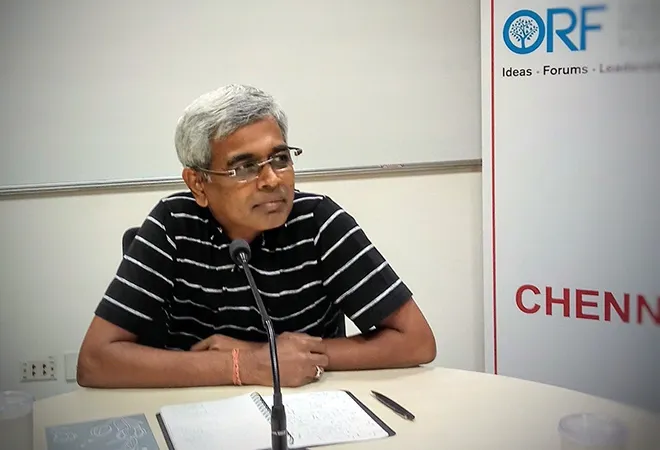Initiating the third session in series titled “Chennai for Gen-2K Millennials” organised by ORF Chennai Chapter, as part of the ‘Madras Day Celebrations-2018’, N Madhavan, Associate Editor, The Hindu Business Line, explored the topic, ‘Industry and Employment in Chennai’, on 18 August. “Has Chennai lost its mojo’ as an economic powerhouse?” he asked, and sought to answer the issues involved and the questions that the title generated.
“Tamil Nadu has proved time and again to be one of the largest economies in the country, with a GDP of 18 billion and earning the enviable position of being in the top five states for economic potential,” Madhavan said. However, the situation looks grim just now for industries in Chennai, with investments slowly diminishing, as evidenced also by the closure of several SMEs.”
Tracing Tamil Nadu’s journey into economic limelight, the speaker said it happened after the first wave of industrialisation, where heavy vehicle companies such as Ashok Leyland were set up in North Chennai and tyre manufacturers such as MRF were set up in Ennore. Along with this, auto- component units such as TVS was established in Padi and conveniently more petroleum units also came intoo existence. The second wave was when global manufacturers such as Ford, Hyundai, BMW, Nissan and Mitsubishi came to Chennai. Companies such as Ford found the ease of doing business to be high, especially being able to get 80 percent of their resources within a distance of 80-km from their factories. Following the success of automobiles, motorcycle manufacturing companies such as Royal Enfield revived itself and set up a new factory at Oragadam in the city suburbs. Madhavan also pointed out that “Chennai has not only established itself as a huge auto-motor hub, but also has a huge research base with high-end design and development in Mahindra city. These developments have helped Chennai establish itself as the Detroit of India”, he said.
Over the years, Chennai has witnessed an upsurge in service sectors such as IT, with several companies such as WIPRO, Infosys and Cognizant coming to the forefront. Along with this, several FMCG producing giants such as CavinKare have set up units in Chennai. The city has also established itself as a strong base for leather industry, explained Madhavan.
The healthcare sector in Chennai has been successful with Chennai being seen as an important destination for medical tourism with the best of hospitals such as Apollo and MIOT. Further, infrastructure development such as building of ports and international airports gave the city several advantages. Apart from all this, Chennai is considered as a safe city and has a well rooted education system. These factors “sold Chennai as an industrial destination in the past” said Madhavan.
Past the glory
However, Madhavan regretted that Chennai’s glorious days were behind it, as the investments have started drying out. This was due to high levels of corruption at the grassroots-level of Government. Unfortunately several projects have been de-routed for this reason. “Huge investments across inter-State borders that otherwise depend on transport infrastructure put up by Tamil Nadu, especially closer to Chennai, are a case in point, he added.
The speaker warned that if the State Government did not take into account such missed investment opportunities and the consequent drifts in employment-generation, the social costs of present decisions, or lack of them, could be huge. Likewise, problems associated with the huge tax notice on Nokia as well as the abrupt shutting down of Sterlite copper unit in Thoothukudi, were bad signals that things were not going well for Tamil Nadu. The chaotic mismanagement of the anti-Sterlite protests was a further sign of a weak governance, he said.
Jobless growth
The problem of jobless growth is going to be a big issue for Tamil Nadu, the speaker said. “Campus recruitment is a thing of the past and many engineering graduates are unemployed,” Madhavan said. He did however mention that “new jobs are being created alongside by start-ups but unfortunately they go unnoticed by the Government and hence do not find a place in the government database.
”In order to make use of this sudden growth in start-ups, the Government needs to create an eco-system where start-ups can thrive and this in the long run can also be a source for employment creation. However, the certain new jobs, created by service sectors do not utilise all the skill sets that an individual possess and as a result undermines his capacity. So, while there may be employment in these sectors, they can be a source of underemployment. Ultimately, he said, to generate employment, the government needs to create more SMEs.
In order to attract more investments into Chennai, the Government needed to restore the lost confidence among the industrialists. Strong governance and the need for a leader with a clear vision of economic development is being felt more than ever, Madhavan said. In conclusion, he said, the Government should not be a headline-seeker and only look to green light big-ticket investment projects at the cost of cutting down of power supply in villages, but rather invest in projects which will bring about real development.
This report was prepared by Madhumita Ashok, II MA-International Relations, University of Madras, and Associate, Observer Research Foundation, Chennai
The views expressed above belong to the author(s). ORF research and analyses now available on Telegram! Click here to access our curated content — blogs, longforms and interviews.




 PREV
PREV

